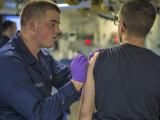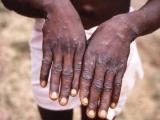Nov 5, 2002 (CIDRAP News) – The Food and Drug Administration (FDA) has updated the licensing for the government's decades-old stockpile of Dryvax smallpox vaccine by approving a new vaccine kit that includes a new diluent and bifurcated needles, according to federal officials.
In a letter to Wyeth Laboratories, the manufacturer, the FDA said it had approved a new 100-dose Dryvax kit containing lyophilized (freeze-dried) vaccine, diluent, a transfer needle, and bifurcated needles. The Oct 25 letter was posted on the FDA's Web site.
Bill Pierce, a spokesman for the Department of Health and Human Services (HHS) in Washington, DC, said the freeze-dried vaccine itself has been licensed since it was made, but supplemental approval was needed because of the new diluent and bifurcated needles. The FDA is approving the vaccine one lot at a time, he said. The Dryvax stockpile contains about 15.4 million doses.
The FDA action reduces the paperwork necessary for use of the vaccine because it will no longer be considered an investigational new drug (IND), Pierce said. IND requirements pertaining to informed consent and patient monitoring govern all treatments that are considered experimental.
The FDA move helps clear the way for the vaccination of US troops who would be deployed to the Middle East if the nation goes ahead with plans to attack Iraq, as well as the possible vaccination of healthcare workers as a precaution against a bioterrorist attack with smallpox. Jerome Hauer, HHS's assistant secretary for public health preparedness, said at a press briefing Oct 4 that HHS would be providing 1 million doses of smallpox vaccine to the Pentagon within a month. A week later, Department of Defense (DoD) officials told the NewYork Times that 350,000 to 500,000 troops would probably be vaccinated because of their likely deployment to the Middle East.
Hauer told the Washington Post last week that most of the first batch of 1.7 million doses of Dryvax has been promised to the DoD. The remaining 13.7 million doses could be used to vaccinate healthcare workers or respond to a smallpox outbreak, the Post report said.
Pierce said he couldn't reveal exactly how many lots or doses have been approved so far, "except to say that they've started to license the first few lots. It's certainly in the millions" of doses. He declined to say how many doses are going to the Defense Department. He noted that federal health officials at the Oct 4 briefing had predicted that the first lots of Dryvax would be licensed by late October or early November.
While the licensing eliminates much of the paperwork that's required for a clinical trial of an experimental treatment, it does not remove the need for informed consent from those who will be vaccinated, Pierce said. How consent will be obtained is not clear yet, but it will be necessary just as it is for routine adult vaccinations such as for influenza, he said.
The Bush administration is currently considering whether to recommend the vaccination of healthcare workers and the general public in the absence of any smallpox outbreak. The Advisory Committee on Immunization Practices in October recommended the preemptive inoculation of hospital staff members most likely to be exposed to smallpox in the event of an outbreak. The committee estimated that the number could exceed 500,000.
In addition to the stockpile of 15.4 million doses of Dryvax, HHS has 75 million to 85 million doses of old smallpox vaccine made by Aventis Pasteur and has 209 million doses on order from Acambis PLC and Baxter International. Clinical trials have shown that Dryvax can be diluted by 5 to 1 without losing its effectiveness.
















